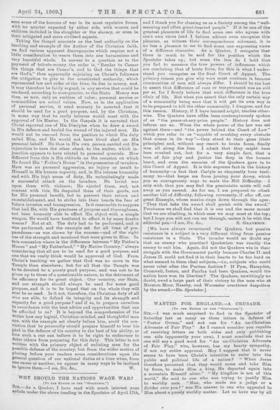WHY SHOULD THE NATIONS WAGE WAR? I To THB EDITOE
OP THE "SPECTATOR:1 SlUr—As a Quaker, I have read with much interest your article under the above heading in the Spectator of April 17th, WHY SHOULD THE NATIONS WAGE WAR? I To THB EDITOE OP THE "SPECTATOR:1 SlUr—As a Quaker, I have read with much interest your article under the above heading in the Spectator of April 17th, and I thank you for classing us as a Society among the "well- meaning and often great-hearted people." If it be one of the greatest pleasures of life to find some one who agrees with one's own views (and I believe editors even recognise this pleasure, as witness their correspondence columns), it is no less a pleasure to me to find some one expressing views of a different character. As a Quaker, I recognise that there is much to be said for the position which the Spectator takes up; but none the less do I hold that you fail to measure the true powers of influences which are combating that of brute force, for this is what I under- stand you recognise as the final Court of Appeal. The primary reason you give why wars must continue is because communities of men will always differ. I should be the lust to assert that difference of race or temperament was an evil per ge, for I firmly believe that such difference is the true elixir of life. But when you assert that the only certain way of a community being sure that it will get its own way is to be prepared to kill the other community, I disagree, and for this reason. History, if I have learned aright, teaches other- wise. The Quakers have often been contemptuously spoken of as "the peace-at-any-price people.". History does not inform me so. When the whole power of the law was set against them—and "the power behind the Court of. Law" which you refer to its "capable of crushing every obstacle that comes in its way "—they stood to their .guns (their principles) and, without any resort to brute force, finally won all along the line. I admit that they might have been crushed out, but for a very simple fact, that • a love of fair play and justice lies deep in the human heart, and even the enemies of the Quakers gave in to this Court of Appeal. It is this supreme fact in the history of humanity—a fact that Carlyle so eloquently bore testi- mony to—that keeps me from joining your Army, which you so courageously urge to scale the Hill Difficulty. - only wieh that you may find the pessimistic mists will roll away as you ascend. As for me, I am prepared to climb another bill of difficulty, following reverently, if afar off, our great Example, whose maxim rings down through the ages : "They that take the sword shall perish with the sword." Perchance we shall find that it is one and the same mount that we are climbing, in which case we may meet at the top; but I hope you will not run me through,' unless it be with the
We have always reverenced the Quakers, but passiie resistance in a subject is a very different thing from passive resistance in a State. The invader would no doubt say that an enemy who practised Quakerism was exactly the enemy to suit him. Again, did not the Quakers win in their struggle with the Government partly because Charles IT. and James IL could not find it in their hearts to be too bard on what seemed to them ideal subjects,—i.e., subjects who could never rebel after the Puritan fashion P If Pym, Hampden, Cromwell, Ireton, and Fairfax had been Quakers, would the nation have won its liberties ? The Quakers, Unwittingly no doubt, owed a large part of their victory to the men who at Marston Moor, Naseby, and Worcester overthrew despotism by the sword.—ED. Spectator.]






















































 Previous page
Previous page